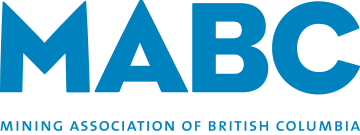FOR IMMEDIATE RELEASE
February 22, 2022
Provincial Budget 2022 misses opportunity to lead on climate and low-carbon mining
VICTORIA, BC – The lack of urgent action in Budget 2022 to address longstanding inequities within the application of British Columbia’s carbon tax for trade exposed industries puts BC jobs at risk and may encourage global mining investment to migrate to jurisdictions with higher GHG emission profiles, says the Mining Association of BC (MABC).
Experts agree the global transition to a low-carbon future requires a significant increase in the production of minerals and metals produced in British Columbia. BC has among the highest carbon taxes in the world, scheduled to rise from $45 to $50 per tCO2e on April 1, 2022, and set to rise further. Yet BC is the only jurisdiction in the world that does not provide meaningful carbon pricing protection for its mining sector. As an export industry, mining is a price-taker in world markets and can’t pass on these higher costs onto customers. BC mines also have among the lowest greenhouse gas emissions in the world.
Budget 2022 did enhance the CleanBC Program for Industry with an additional $111 million for the CleanBC Industry fund, but this funding is targeted to the 2024/25 fiscal year, two years from now, and won’t provide price parity in the near term. Government is launching an industrial carbon taxation review this year, and MABC strongly urges the provincial government to adjust BC’s carbon pricing so trade exposed sectors can compete fairly with jurisdictions that don’t pay a carbon tax or don’t pay enough.
“We have an outsized opportunity in BC to provide the minerals and metals needed in the global fight against climate change while creating significant benefits for workers, local and Indigenous communities and revenue needed to fund public services,” said Michael Goehring, President and CEO of MABC. “But if the provincial government doesn’t change the application of the carbon tax so it is on par with other Canadian and global jurisdictions, capital investment and jobs will migrate to jurisdictions with less stringent environmental protection and higher emissions.”
BC has 16 major mines and two smelters, which support more than 35,000 stable, high-paying jobs in every region of the province and provided $2.65 billion in tax revenue to all levels of government in 2019. BC’s mines and smelters also support 3,700 small, medium, and Indigenous businesses in 215 BC communities through an annual spend of nearly $3 billion on goods and services.
There are seven major new mines or mine expansions expected to make final investment decisions in the next 12-24 months, collectively representing $4.2 billion in capital investment, more than 6,000 direct jobs and estimated annual tax revenue for governments of nearly $450 million once in operation.
“MABC supports the carbon tax and collective efforts to combat climate change. Our industry has taken steps to be among the least GHG-intensive mines in the world, and continues to invest in emissions-reducing technologies,” said Goehring. “Bringing BC’s carbon tax into line with other Canadian and global mining jurisdictions will enable BC’s mines to reduce emissions further and faster, compete more fairly in global markets, and fulfil our potential as a responsible supplier of the low carbon minerals and metals the world needs to reach its Paris Agreement targets.”
The Climate Solutions Council has previously also advised the government to “address the competitiveness challenges faced by emissions-intensive, trade-exposed industries while supporting emissions reductions.”
-30-
About the Mining Association of British Columbia
MABC is the voice of British Columbia’s mineral and metal producers, steelmaking coal, smelters and advanced development companies. Our industry benefits all British Columbians and supports more than 35,000 jobs and over 3,700 small, medium and indigenous affiliated businesses in every corner of the province through an annual spend of nearly $3 billion on goods and services. Our members’ products have among the lowest carbon footprints globally and are helping the world transition to a cleaner, low-carbon future; safely and responsibly.
For more information:
Matt MacInnis
Vice President, Communications
[email protected]
(778) 628-1703


